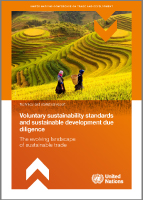Voluntary sustainability standards and sustainable development due diligence

International trade, particularly trade through global value chains (GVCs), is increasingly associated with significant sustainability issues such as deforestation, climate change, and labour and human rights violations.
To address sustainability issues in GVCs, many voluntary governance instruments have been developed, such as voluntary sustainability standards (VSS). Such VSS have been at the forefront of sustainable GVCs governance for the past two decades.
However, these voluntary instruments have overall fallen short of generating large-scale transformative changes, partly due to a relatively limited uptake. As a result, many sustainability concerns remain.
In response, a shift towards mandatory approaches towards sustainable trade governance has been observed in recent years, such as the emergence and proliferation of due diligence regulatory initiatives, which aim to tackle the adverse sustainability impacts of business operations along GVCs.
Sustainability due diligence
Sustainability due diligence is a process through which companies need to identify, address, cease, prevent and/or mitigate actual or potential risks of contributing to any adverse sustainability impacts associated with their activities or sourcing decisions, as well as keep track of and communicate their actions to address these risks.
These regulatory developments mark a shift for international trade and sustainability governance in GVCs, and discussions are now turning to the implementation of such due diligence regulations. In particular, questions are being raised about the potential role of existing governance instruments such as VSS in supporting due diligence implementation, with important concerns arising about the impact of due diligence initiatives for developing countries.
Developing countries have been relatively distanced from the discourse around due diligence, which is more prevalent in developed countries. While they are on the frontline of due diligence implementation, these requirements are likely to be highly challenging for them.
This report is based on current ongoing work and discussions from both academic researchers and policymakers. It takes stock of current questions and concerns about due diligence developments and their implications for international trade, for the role of VSS in GVCs sustainability governance, and for developing countries.
Main takeaways
- Due diligence regulatory initiatives are proliferating, complex, and will have important implications – both direct and indirect – for international trade and developing countries, including through trade diversion, trade segregation, sourcing diversion, and exclusion of vulnerable economic actors.
- Developing countries will be the primary targets of due diligence regulations and will face significant challenges in implementing due diligence requirements.
- VSS present synergies with the due diligence process and could be used as supporting tools for the implementation of due diligence requirements.
- The emergence and proliferation of due diligence initiatives will likely influence VSS, the VSS market, and the sustainability benefits they can deliver.
- Lessons can be learned from past research on VSS to inform an effective and inclusive implementation of due diligence requirements, including on audit systems, complaint and grievance mechanisms, and inclusiveness.
- Lessons can be learned from past research on VSS about developing countries’ concerns about unilateral due diligence regulatory initiatives emerging from developed countries, as well as regarding the conditions necessary for sustainable GVCs governance instruments to be effective in specific contexts.
- There is a need for enhanced engagement among stakeholders and for the creation of multilateral avenues for dialogue and cooperation, capacity-building, and support.




